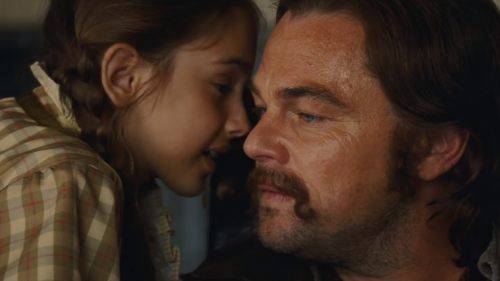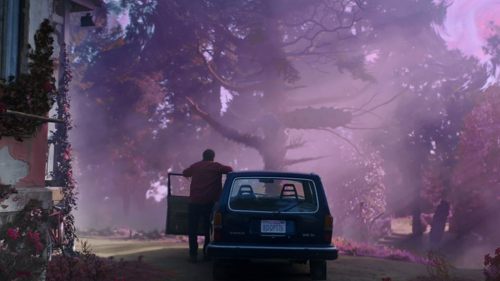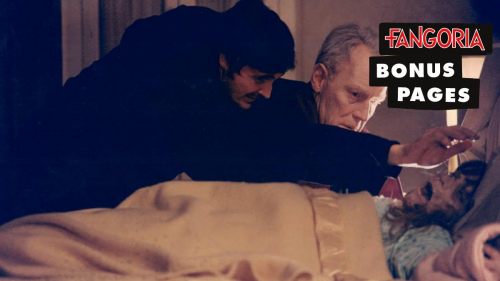Our Daily Trailer: THE EXORCIST
The above trailer for The Exorcist is one I've never seen before, and its stripped down, minimalist tone seemed to fit, on an aesthetic level, this week's theme of cinematic experiences burning into our psyches at a young age. (It also comes with a photosensitive epilepsy warning, so heads up.)
I'm not saying The Exorcist is definitely the first film I ever saw, but it's the first film I remember watching. It was in 1974, at the Rt 35 Drive-In in Hazlet, NJ. The plan was probably for my siblings and me to be asleep in the back of the station wagon used to haul us to that open-air gravel field every other week. I’m not saying this was the best parenting call in the world; I was a night-owl since birth and the movies I saw under the guise of “asleep at the drive-in” - Kentucky Fried Movie, Don’t Look In The Basement, Sssssss - would probably get my parents a visit from Social Services today. But Mom and Dad meant well, and with seven kids from two marriages, they did the best they could. And so, three year-old me was very much not asleep during The Exorcist. While I don’t recall the experience from beginning to end, when I watch the film today, certain images - frosty breath in a darkened room, Father Merrin (Max von Sydow) soaking up green vomit with his sash, Regan (Linda Blair) opening the nightstand drawer telekinetically - instantly take me back to when I was watching those scenes playing fifty feet high through a car windshield forty years ago.
But that’s not when The Exorcist really did a number on me. That happened during its first television broadcast on CBS, which was probably somewhere around 1979 or 1980 (I've looked; does anyone out there know for sure?). In the years between my drive-in viewing and its TV premiere, the movie had taken on a boogeyman quality in my house, coasting on reputation more than anything. My older siblings would whisper “Ehhhhhcksssorrrrrrrcisssssst” down the hall at me to scare me, which it did, for some reason. And for some other reason, we all watched it (or parts of it) again on TV, and this time it freaked me out properly. Watching my teen brothers and sisters - my protectors! - scared silly served to amp up my own fear. And this time the film's masterful sound design burned its way into my imagination. (Jump scares are more effective when they aren’t piped through a drive-in’s hanging window speaker.). Even the level of static particular to NYC’s Channel 2 unnerved me. The whole affair really left a mark this time. By day, we would try to out-spook each other with impressions of the possessed Regan. By night, I'd wind myself into a fright looking down the empty hall at a closed bedroom door. My younger brother and I, our beds set head-to-head in an L-shape, slept for six months with one’s hand on the other’s arm.
Yes, it's safe to say that The Exorcist "fucked me up as a kid", as per this week's theme eligibility requirements. But it wasn't done messing with me. As I grew up, I discovered that The Exorcist lost nearly none of its power over me, but the ways in which the film resonated shifted considerably with age. As a child viewer, the surface scares obviously did the job, but it all would’ve been nothing but cheap spookhouse thrills without the subtext of Regan’s plight. Being poked by doctors, feeling helpless and small, overpowered by something too large for her (or me) to get my brain around. That narrative spoke to me on a very primal level in the 70s. As an adult, I came to empathize with Chris (Ellen Burstyn). Though I’m not a parent, the terror and frustration of being unable to help a loved one in pain, and dealing with bureaucracies who have no interest in aiding you, feels wholly relatable.
And in the past decade I’ve really come to identify with the arc of Father Karras (Jason Miller). Karras, trying to reconcile his lost faith in the wake of an indifferent universe reaching out and extinguishing a life he held dear, is one of the most gut-wrenching portrayals of midlife crisis ever shown on film. Karras has been living his life for others, doing what he’s told, trying to be “good.” But when we first meet Karras he's starting to feel it's not enough to sustain him. Later all his values and beliefs are vaporized when he sees his ailing mother strapped to a bed in Bellevue, his priest's salary an insufficient means to properly care for her. His mother’s life as a “good Catholic” ends pathetically and unceremoniously, surrounded by strangers. There is no evidence of God or Heaven in her downward spiral. It’s even pointed out that Karras’ decision to become a priest directly prevented his mother from living a better life. Karras is shattered, his guilt and anger sending him on a one-way ticket to that house in Georgetown, in search of not just redemption and salvation, but any kind of sign that some higher power is running this shitshow.
Though director William Friedkin argues otherwise - if there are devils, he’s said, there must also be angels - I see no evidence of a higher power in the film. God never shows up; the evil is ultimately bested by a terrified, desperate man with no one - celestial or otherwise - backing his play. That’s terrifying, and that sounds about right. More than I could have imagined as a kid, in my 40s I’ve come to understand The Exorcist as a brilliant horror film for adults.



